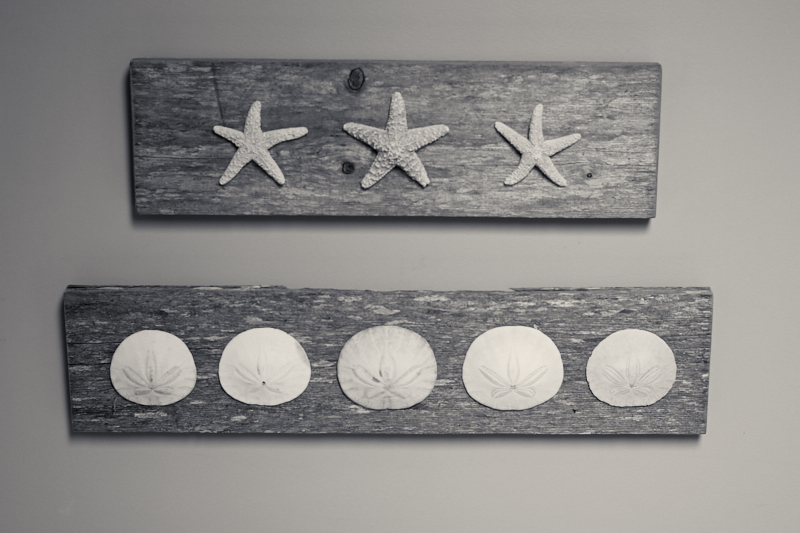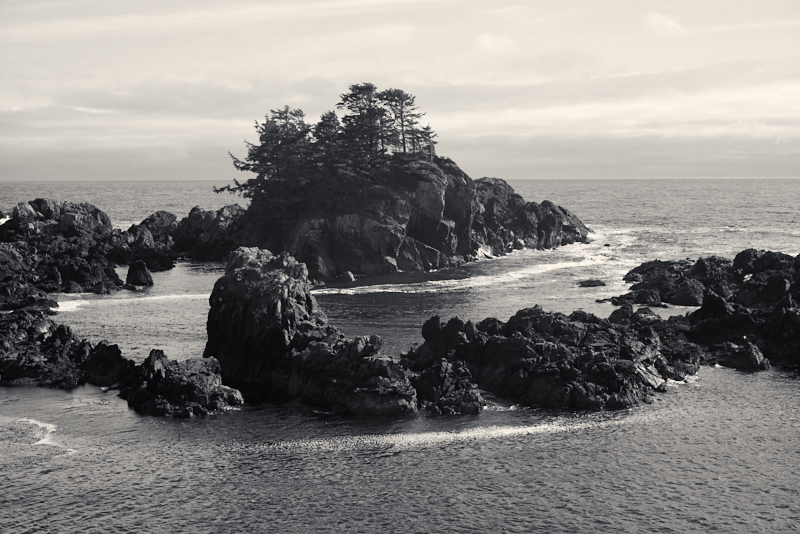The Salish Sojourn VII
Ucluelet, British Columbia

Storm-ground rocks near Amphitrite Point, Ucluelet, BC
Ucluelet is a small fishing village that clings like a limpet to the storm-battered coast of Vancouver Island. Wedged between Tofino and the Barkley Sound, Ucluelet — a name that means "people of the safe harbor" — provides one of the few refuges for commercial fishermen on the uninhabited western side of the island. Decades ago, the small fleet that shelters here was the mainstay of the local economy, but today tourism provides the dollars to keep the town alive. On this pristine, unspoiled coast, visitors can hike, fish, watch whales, and paddle kayaks. Sailors and boaters can explore the Broken Islands of the Barkley Sound. Wildlife — marine, terrestrial, and aerial — abounds. Walking the empty beaches, one could easily believe that they had been transported back five hundred years, to an age before the coming of the European settlers who altered landscapes wherever they traveled.
We are a long way from the developed eastern side of the island. It has taken five hours to drive from Victoria to Ucluelet; we should consider ourselves lucky that it didn't take longer. For most of the town's history, there hasn't been a road from the eastern side of the island. It wasn't until 1961 that a network of logging roads was stitched together to form a potholed path between Ucluelet and the motorized world.

Creeks fall through the wilderness on the road to Ucluelet
Today, Highway 4 — Vancouver Island's longest East-West route — winds through fog-washed mountains and trees, tumbling creeks and still lakes. Driving west, the sense of isolation grows with every kilometer. Apart from the highway and the occasional traces of logging in the brooding mountains, there is no evidence of human impact on this land: no towns, farms, service stations. The forest rolls back to permit a small human settlement at Port Alberni, but then closes in again. Road signs display warnings — not that services are sparse in the miles ahead, but rather, that they are non-existent: check your gas gauge now.
Humanity has cut a thin, two-lane ribbon through the wilderness, but the forests surround it. The wilderness is not adversarial, it is simply indifferent. Were you to wander off the highway, the land would absorb you like a pebble dropped in a very deep lake. I'm certain a float plane could deposit you in the northern interior of British Columbia and you would feel more cut off, but there is an astonishing distance, mentally and physically, between the busy city of Victoria, and these dark forests populated by eagles, wolves, and ravens.
After a long drive, we reach our destination. Ucluelet's "Safe Harbor" is formed by a natural barrier of stone, a ridge that runs northwest to southeast for approximately four miles, separating a small swath of sheltered water from the sea. Its southern end is open, guarded by the lighthouse at Amphitrite Point. The town lines the inner, harbor-side of the ridge, while the outer side consists of rocky beaches, a couple of resorts, and the Wild Pacific Trail.

Cannery, Ucluelet, BC
We are staying in the Whiskey Landing Lodge. It is a three star(fish) hotel, a fact easily discerned in the bathroom. It is also for sale: if any readers wish to invest in a small hotel with big potential, 3.9 million Canadian dollars will give you the keys and title.

The Whiskey Landing Lodge, a three star(fish) hotel that costs a few (sand)dollars
Our room is on the top floor of the building. Wide picture windows overlook the roof of the aquarium, and beyond, a marina, lined with commercial boats. We also appear to be right beneath a flight path for bald eagles. As evening approaches, they wing along the rim of the harbor, and pass over us, no more than 10 feet from our window. Were it not for the glass that separates us from the world, we could reach out and stroke their feathers as they go by. It is absolutely amazing. An eagle-phile could sit in a chair and watch them make fly-overs for days, never leaving the room, and then go away happy. I have never seen so many Bald Eagles in one place before.
The restaurants are busy tonight. We luck into a spot without a reservation. I ask the waitress if this is typical. She confirms it.
"It's always like this in the summer, but in the winter there won't be any work and we will have a lot of time off."
"So what happens then? What do you do when there's no business?" I enquire.
"Some people spend their time surfing, others go to Southeast Asia."
"Which do you do? Do you surf?"
She smiles. "I go to Asia. It's fun when you are young, but you start to wish for something more stable."

Life on the edge, Ucluelet, BC
Life on the edge: the town motto, a perfect description for this small, remote town. When the tourists vanish at summer's end, and the wild Pacific storms resume their war with the obdurate stone shores, Ucluelet will feel very remote. The fury of the sea before you, the silence of a vast forest behind. It would take a special person to live here year round.
If you are enjoying this series, why not subscribe to Richard's monthly newsletter, What's New in Old News? The Peripatetic Historian is on the road, roaming the world and compiling fresh adventures. Don't miss out. Click here to join the legions of above-average readers who have already subscribed.